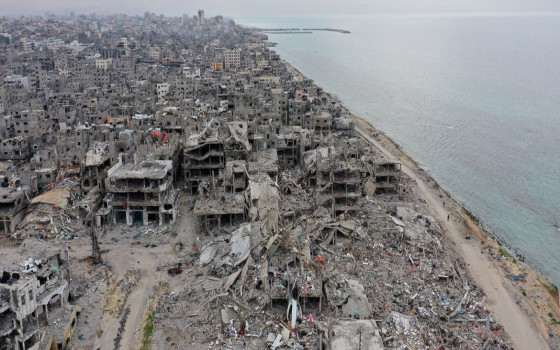
The situation in Gaza: The health needs are enormous, and everyone's mental health has been affected by the war

- Europe and Arabs
- Friday , 7 February 2025 9:59 AM GMT
Gaza, New York: Europe and the Arabs
A World Health Organization official reiterated that the health needs in the Gaza Strip are "enormous", especially after many hospitals and primary health care centers went out of service, in addition to the impact on the mental health of everyone in Gaza due to the conflict that lasted for more than 15 months.
This came in statements made via video from the Gaza Strip by the WHO Representative in the occupied Palestinian territory, Dr. Rick Peeperkorn, to journalists at the daily press conference at the United Nations headquarters in New York. According to the UN daily news bulletin, a copy of which we received this morning, Friday,
Peeperkorn said: "Everyone in Gaza is affected by this conflict that lasted between 15 and 16 months. Everyone basically, including my team, suffers from stress, anxiety, loneliness, depression, etc., everywhere."
He pointed out that before the war there was a psychiatric hospital and more than six community mental health centers, and a good network of non-governmental organizations, but "all of this stopped working or was destroyed." He pointed out that the ceasefire allowed the organization to expand the scope of the health response, indicating that more supplies were being sent to the sector.
Incredible destruction
The UN official described the situation in the Jabalia area in the northern Gaza Strip as having become like "a wasteland. The scale of the destruction is unbelievable."
He pointed out that in northern Gaza, there is only one partially functioning hospital, Al-Awda Hospital, while Kamal Adwan Hospital was completely destroyed and burned, and the Indonesian Hospital is also not functioning.
He reported that the organization, the Palestinian Ministry of Health and partners are planning to clear sites around Kamal Adwan Hospital to establish an outpatient clinic, primary health care centers and a trauma stabilization point, "because people are also returning to Jabalia."
He explained that they are working on expanding the scope of work at Al-Shifa Hospital in Gaza City, in addition to assessing the situation at the Indonesian Hospital to restore it to operation. Peeperkorn said that it is impressive to see those hospitals that had become inoperable, "operating again amidst all this destruction. Some of their departments are operating as referral hospitals."
Regarding the situation in the south, specifically Rafah, the WHO representative in the occupied Palestinian territory said that Rafah, like Jabalia, has become “a wasteland, with widespread destruction.” He pointed out that the three main hospitals there are completely out of service: Al-Najjar Hospital, the Emirati Hospital and the Kuwaiti Hospital.
He explained that as people return to Rafah, the organization is planning to establish a point to stabilize trauma and provide primary health care.
Medical Evacuations
He also spoke about medical evacuations, as part of the ceasefire agreement is to allow 50 critical patients per day to be evacuated. However, he added: “We have not reached 50 cases all these days, but between 36 and 39 cases, in addition to their companions. It is very important that we speed this up.”
He pointed out that the organization estimates that between 12,000 and 14,000 people are in need of medical evacuation, including at least 5,000 children.
“There should be more patients passing through the Rafah crossing to Egypt. But we also want other medical corridors. The first medical corridor that we really want to restore is the traditional referral route to the West Bank and East Jerusalem,” he said.
Regarding the situation in the West Bank, Peeperkorn noted that the ongoing operations there are affecting health care.
He said the organization is working to pre-position supplies for major hospitals and to train on mass casualty management. He explained that the organization already has a trauma care program in the West Bank that provides emergency stocks.












No Comments Found